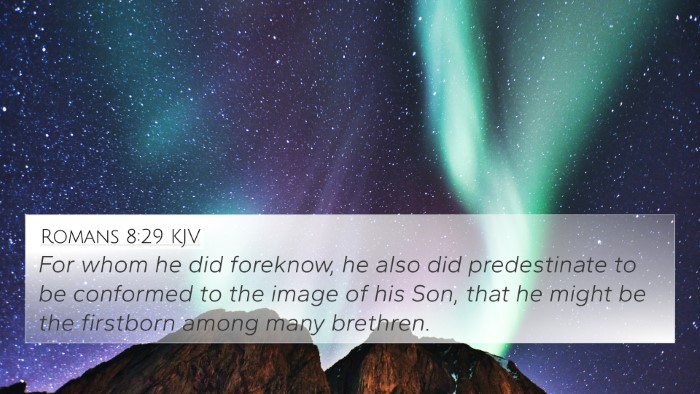Old Testament
Genesis Exodus Leviticus Numbers Deuteronomy Joshua Judges Ruth 1 Samuel 2 Samuel 1 Kings 2 Kings 1 Chronicles 2 Chronicles Ezra Nehemiah Esther Job Psalms Proverbs Ecclesiastes Song of Solomon Isaiah Jeremiah Lamentations Ezekiel Daniel Hosea Joel Amos Obadiah Jonah Micah Nahum Habakkuk Zephaniah Haggai Zechariah Malachi1 John 4:10 Similar Verses
1 John 4:10 Cross References
Herein is love, not that we loved God, but that he loved us, and sent his Son to be the propitiation for our sins.
Uncover the Rich Themes and Topics of This Bible Verse
Listed below are the Bible themes associated with 1 John 4:10. We invite you to explore each theme to gain deeper insights into the Scriptures.
1 John 4:10 Cross Reference Verses
This section features a detailed cross-reference designed to enrich your understanding of the Scriptures. Below, you will find carefully selected verses that echo the themes and teachings related to 1 John 4:10 KJV. Click on any image to explore detailed analyses of related Bible verses and uncover deeper theological insights.

Romans 5:8 (KJV) »
But God commendeth his love toward us, in that, while we were yet sinners, Christ died for us.

1 John 2:2 (KJV) »
And he is the propitiation for our sins: and not for our's only, but also for the sins of the whole world.

John 15:16 (KJV) »
Ye have not chosen me, but I have chosen you, and ordained you, that ye should go and bring forth fruit, and that your fruit should remain: that whatsoever ye shall ask of the Father in my name, he may give it you.

Deuteronomy 7:7 (KJV) »
The LORD did not set his love upon you, nor choose you, because ye were more in number than any people; for ye were the fewest of all people:

John 3:16 (KJV) »
For God so loved the world, that he gave his only begotten Son, that whosoever believeth in him should not perish, but have everlasting life.

Titus 3:3 (KJV) »
For we ourselves also were sometimes foolish, disobedient, deceived, serving divers lusts and pleasures, living in malice and envy, hateful, and hating one another.

1 John 3:1 (KJV) »
Behold, what manner of love the Father hath bestowed upon us, that we should be called the sons of God: therefore the world knoweth us not, because it knew him not.

2 Corinthians 5:19 (KJV) »
To wit, that God was in Christ, reconciling the world unto himself, not imputing their trespasses unto them; and hath committed unto us the word of reconciliation.

1 Peter 2:24 (KJV) »
Who his own self bare our sins in his own body on the tree, that we, being dead to sins, should live unto righteousness: by whose stripes ye were healed.

1 Peter 3:18 (KJV) »
For Christ also hath once suffered for sins, the just for the unjust, that he might bring us to God, being put to death in the flesh, but quickened by the Spirit:

Romans 8:29 (KJV) »
For whom he did foreknow, he also did predestinate to be conformed to the image of his Son, that he might be the firstborn among many brethren.

Romans 3:25 (KJV) »
Whom God hath set forth to be a propitiation through faith in his blood, to declare his righteousness for the remission of sins that are past, through the forbearance of God;

Daniel 9:24 (KJV) »
Seventy weeks are determined upon thy people and upon thy holy city, to finish the transgression, and to make an end of sins, and to make reconciliation for iniquity, and to bring in everlasting righteousness, and to seal up the vision and prophecy, and to anoint the most Holy.
1 John 4:10 Verse Analysis and Similar Verses
Meaning and Interpretation of 1 John 4:10
Verse Reference: 1 John 4:10
Bible Verse: "Herein is love, not that we loved God, but that he loved us, and sent his Son to be the propitiation for our sins."
Overview of the Verse
This verse encapsulates a profound theological concept regarding the nature of love from a Christian perspective. It highlights the preeminence of God's love as the initiating factor in our relationship with Him.
Commentary Insights
-
Matthew Henry:
Henry emphasizes the unconditional nature of God's love, showcasing that it is not based on our merit but rather on God's grace. He points out that God's sending of His Son is the ultimate expression of love, one that serves as a model for our own love towards others.
-
Albert Barnes:
Barnes highlights the significance of the term "propitiation," explaining it as Christ’s sacrificial atonement for humanity's sins. This act not only satisfies divine justice but also establishes a new covenant of love and relationship between believers and God.
-
Adam Clarke:
Clarke provides a detailed analysis of "love," suggesting that true love is not merely an emotion but an action that involves self-sacrifice for the benefit of others. He underlines that God's love is the foundation upon which all human love must be built.
Theological Themes
The themes within this verse can be connected with numerous other scriptures, creating significant inter-Biblical dialogue:
-
Divine Love:
This verse is a cornerstone in understanding divine love, paralleling with Romans 5:8 where it states that “God demonstrates His own love toward us, in that while we were still sinners, Christ died for us.”
-
Atonement:
The concept of propitiation here connects to Hebrews 9:26 which discusses Christ as the ultimate sacrifice who has appeared to put away sin.
-
Redemptive Love:
This theme is echoed in John 3:16, “For God so loved the world, that He gave His only begotten Son…”, establishing a direct link between God’s love and the act of giving.
-
Response to Love:
In 1 John 4:19, it states, “We love Him because He first loved us,” affirming the notion that our love for God is a response to His love for us.
-
God's Initiative:
This verse emphasizes God’s initiative in loving us, which correlates with James 1:17 stating that every good gift comes from above.
-
Calling to Love:
Jesus commands us to love one another in John 13:34, showing that our capability to love stems from our understanding of God’s love.
-
Love as an Essential Nature:
Referencing 1 John 4:8, “He who does not love does not know God, for God is love,” illustrates that love is integral to God’s character.
-
Hope in Love:
This connection adds depth to the understanding provided in Romans 8:39 that emphasizes nothing can separate us from the love of God.
Cross-Referencing Insights
The practice of cross-referencing Bible verses allows readers to gain a multi-faceted understanding of scripture. Here are some tools and methods to enhance this study:
- Bible Concordance: Utilize a concordance to find keywords that connect different scriptural passages.
- Bible Reference Resources: Utilize reference books or online systems designed for effective cross-referencing, particularly in thematic studies.
- Cross-Reference Bible Study: Engage in systematic study methods that connect various Bible verses contextually.
- Inter-Biblical Dialogue: Consider how specific themes persist across both Testaments, adding depth to your understanding.
Practical Application
Understanding 1 John 4:10 and its related verses can beneficially impact personal faith and community. Here’s how:
- Affirmation of God’s Love: Regular meditation on God’s unconditional love encourages believers to reciprocate that love in their daily lives.
- Encouragement to Love Others: Knowing that our love mirrors God’s love prompts actionable changes in how we interact with others.
- Foundation for Spiritual Growth: This understanding fosters a mature faith that recognizes the necessity of God's grace in every aspect of life.
Conclusion
1 John 4:10 serves as a vital reminder of the nature of love in the Christian faith. By employing tools for cross-referencing and exploring thematic connections, believers can enrich their spiritual understanding and application.
Further Study and Reflection
Consider digging deeper into the cross-references provided above to cultivate a richer comprehension of how these verses interconnect and support each other in conveying the grand narrative of God's love.





